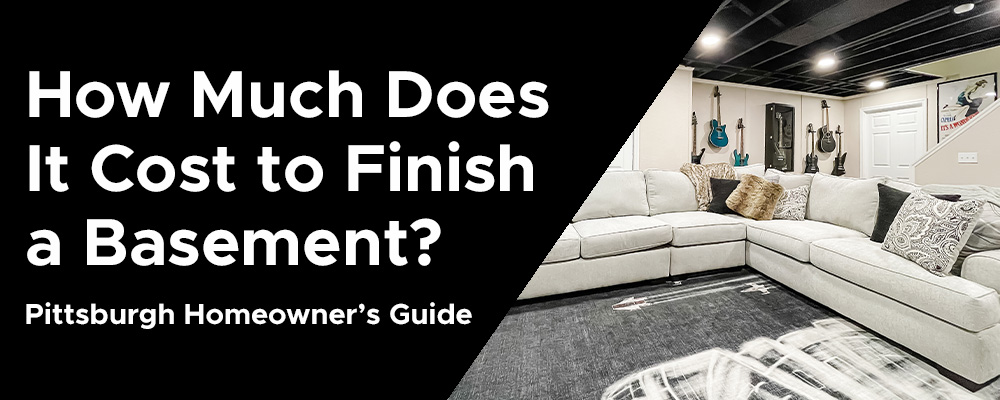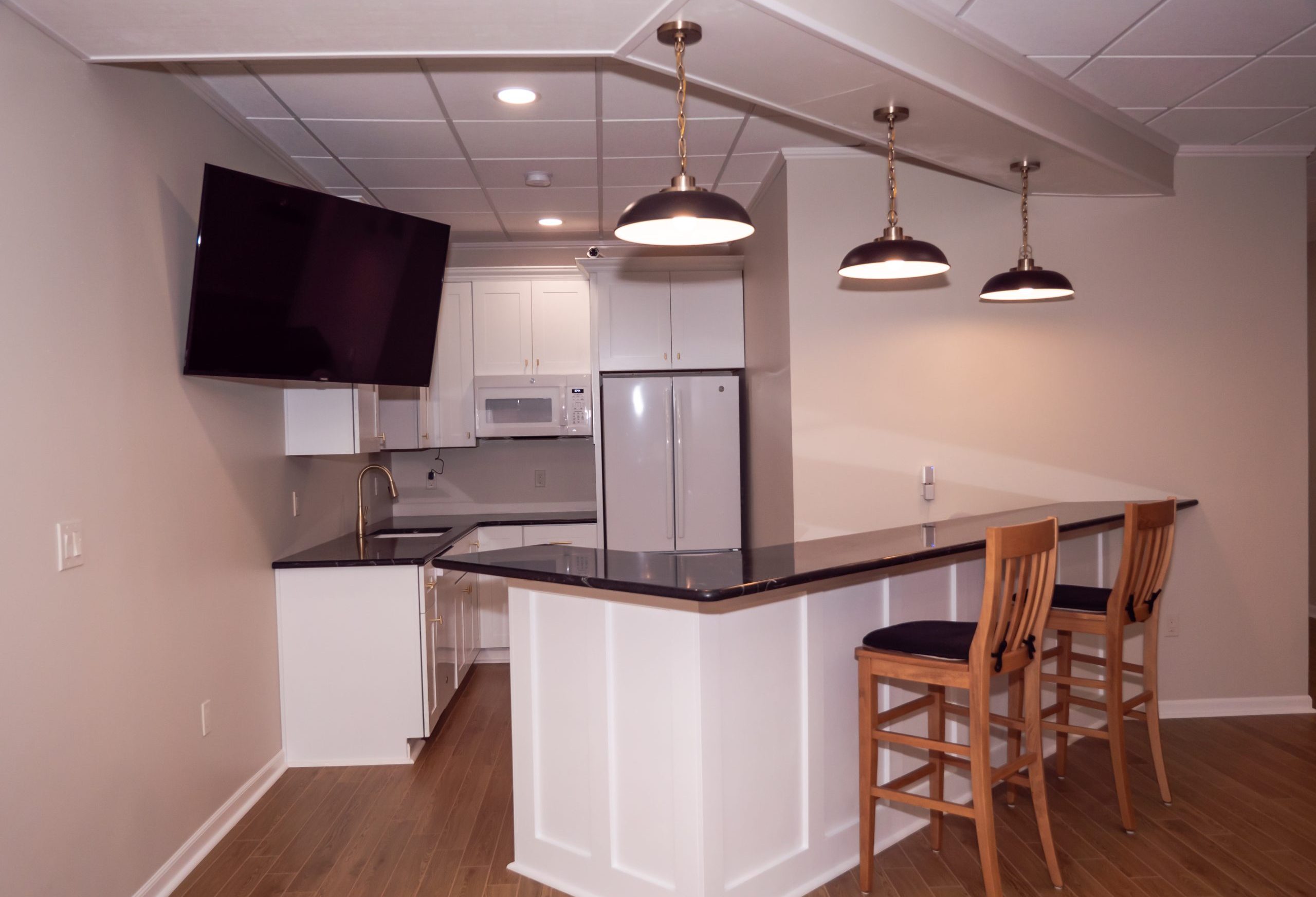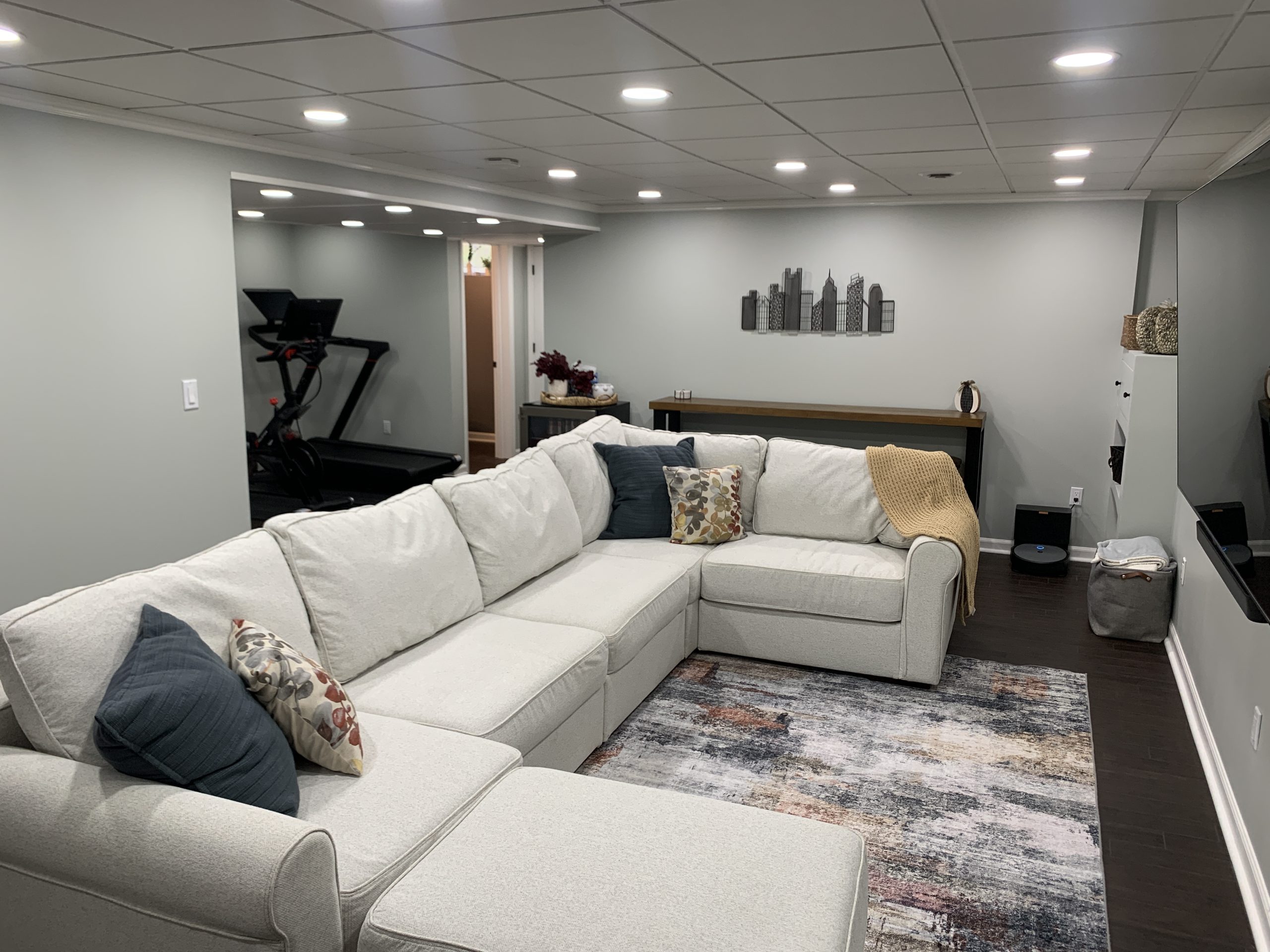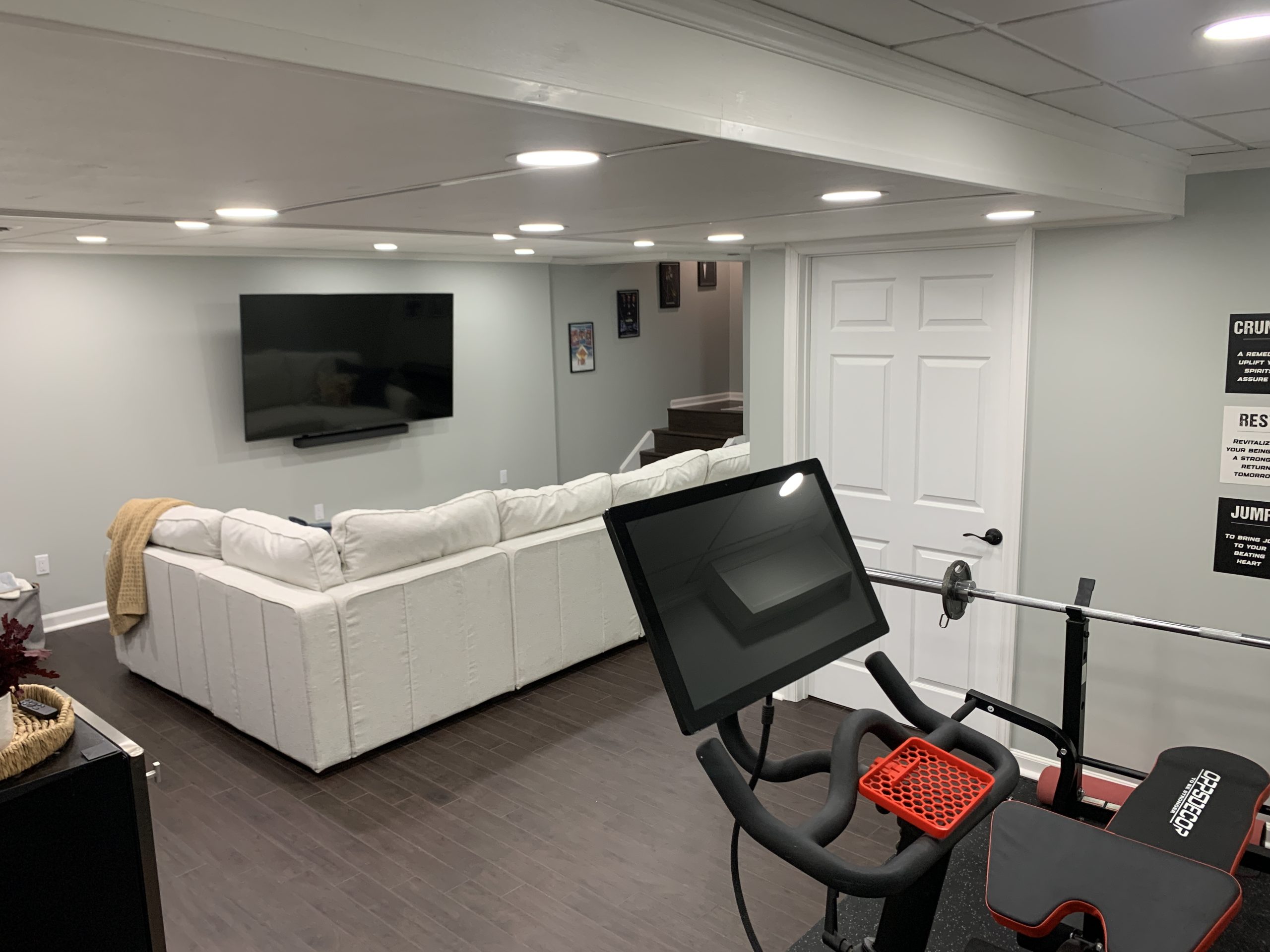Are you trying to budget basement finishing in this year's list of home improvement projects, but are frustrated by unclear pricing? Many Pittsburgh homeowners face sticker shock and confusion when they receive basement finishing quotes that vary by thousands of dollars. Without a clear understanding of the factors that drive pricing, it’s easy to overpay or not make the best choice for your home’s needs. In the Pittsburgh area, homeowners can expect to pay between $8,000- over $100,000 to finish their basements.
As the Greater Pittsburgh area’s only Total Basement Finishing dealer for over seven years, Energy Swing understands key cost factors and has helped hundreds of homeowners finish their dream basements. As a basement finishing company that offers a premium product, we understand that we aren’t the best match for every homeowner. We want to be transparent about our costs and the costs of traditional finishing. It’s important that you choose the method that makes the most sense for your home and needs.
In this guide, we’ll break down price ranges, customization options, and ways you can save money so you can confidently make the best basement finishing choice for your budget.

How much does finishing a basement in Pittsburgh cost?
In Pittsburgh, the price of basement finishing can fall anywhere between the range of $10,000 to over $100,000 depending on size and features. Many factors create such a large range, so let’s break it down, starting with who does the project:
Low-range: $10,000 - $30,000
Prices within this range are typically Do-It-Yourself (DIY) projects or done by a general handyman. The DIY method will take the longest to finish, typically up to a year; especially if you don’t have prior experience. Basement finishing isn’t your full-time job, so you can only work on it after work or on the weekends which can drag out the process even longer.
A basic handyman, for example, can be a contractor who does decks in the summer, but to keep busy in winter, he switches over to basements. These contractors do not specialize and aren’t trained in basement finishing projects. The construction, moisture control, electrical and plumbing in a basement can be complex.
Mid-range (experienced contractors with standard finishes): $25,000 - $50,000
Many already established remodeling companies will fall within this range. The layouts of the space are simple without any partition walls to create separate rooms. There won’t be any highly customized options such as kitchenettes, luxury bathrooms, or materials specific to the basement environment. You can expect a standard room that a more experienced contractor installs.
Premium-range (custom builds with premium features and specialty materials): $50,000 - $100,000+
These contractors specialize in basement finishing and are highly trained. They may even offer a premium product that sets them apart from other companies. The installers are highly trained craftsmen who can handle intricate details for a highly customized look. Custom builds can include intricate tile work, kitchenettes or bars, and full bathrooms.
The Total Basement Finishing system uses premium finishing materials. The components are specifically engineered for the damp, basement environment. These materials are only available by licensed dealers and installed by trained professionals. Because of this, they have a higher price compared to traditional materials.
Why does basement finishing cost so much in Pittsburgh?
Now that we’ve covered the ranges of expertise associated with price, here are other major factors to consider.
- Size of the Space- On average, finishing a basement in Pittsburgh costs between $50 and $200 per square foot. The larger the basement, the higher the cost due to increased material and labor requirements.
- Design Complexity- Additional rooms like bedrooms, bathrooms, or kitchenettes add to the overall cost.
- Specialty Features- Adding features such as wet bars, fireplaces, or smart home technology can significantly impact pricing.
- Material Choices- Basic drywall and paneling are more affordable, while specialized wall systems engineered for basements may cost more.
- Plumbing and Electrical Work- Extensive electrical installations, lighting upgrades, and plumbing for bathrooms or laundry rooms add to the budget.
- Existing Conditions and Demolition- If an old basement needs to be gutted of previous finishings or has outdated plumbing or electrical, demolition and necessary repairs will increase costs.
- Water Damage and Remediation- Mold remediation or waterproofing measures can be necessary before finishing, adding to expenses.
What do you need to finish a basement properly?
Essential components are steps in the finishing process that are rarely skipped as they are needed to complete the project. With each component, there are different material choices you can make that will affect price.
- Water Issues- If you have visible water on the walls or floor, you may need to have the basement waterproofed and install a French Drain. Meet with a specialist to see what option is best for you.
- Moisture Control- This is for the water you can’t see. Moisture found in the air of a dark basement creates an environment for mold and mildew growth. Consider dehumidifiers and air purifiers in this park of your home to keep the air clean and dry.
- Floor Preparation- Most flooring materials specify that the existing concrete floors needs to be reasonably level. You may have to level the concrete floor by using a leveling compound if needed.
- Walls- Drywall, paneling, or moisture resistant wall systems. It’s important to consider existing obstructions like pipes, support columns, ductwork, and furnaces, for example.
- HVAC and Insulation- Ensuring comfort and efficiency in the space is important. Use proper insulation on walls and ceilings to prevent moisture buildup and maintain whole house comfort.
- Flooring- Options include vinyl, carpet, tile, or engineered wood. If you experience water problems, it is smart to consider what waterproof options are available.
- Ceiling- Drop ceilings, drywall, or exposed painted ceilings are all options. If you have low clearance in your basement, an industrial black-painted look is recommended to keep it to code.
- Lighting and Electrical- Recessed lights, outlets, and smart home integrations. To ensure safety for your home, some projects may require a sub-panel to handle the additional electrical needs.
- Egress Windows- Required for safety if a bedroom is added. Many contractors will not add an egress if one does not already exist in the space.
- Upgraded Bathroom and Kitchen Additions- Plumbing, fixtures, cabinetry, and any other custom requests.
How can you save money when finishing your basement?
If you don’t want to fully DIY your basement project, here are other tips to consider so you can get the best bang for your basement finishing buck.
- DIY Demolition- If a basement already has finishes, homeowners can save on labor costs by removing old finishes themselves.
- Minimizing Complexity of Layout- Keeping an open-concept layout rather than adding multiple rooms helps cut costs. If your basement is very large, only finish a portion of the space, and leave the other for storage. A partition wall can be placed to cover the unfinished area.
The basement above kept an open concept but opted to leave the back area of their basement unfinished for storage. Beside the workout equipment there is a door to access the storage space, but keeps it out of the way.
- Prioritizing Must-Haves- Focus on essential components first and add luxury features later if the budget allows. Start with the basics when planning and add on from there.
- Choosing Cost-Effective Materials- Opting for standard drywall and vinyl flooring can reduce expenses, but not perform well for the long-term. You should keep in mind that existing water issues should be taken care of first as these standard materials can easily be damaged in basement environments.
How do permits and inspections affect the cost of Pittsburgh basement finishing?
In general, hiring electricians or plumbers to install up to code can cost 5%-10% of the basement project. Permits for plumbing are around $100 each and electrical permits are about $85 each. The rules and regulations around permits and inspections vary based on the county you live in.
- Building Permits- Necessary for structural changes and electrical or plumbing work. The wait time for the permits can sometimes be 10 or more days. Each additional day can add another 15% of costs to the project.
- Electrical and Plumbing Inspections- Ensures compliance with safety codes and local regulations. Not all counties have plumbing inspections, but electrical is state mandated.
- Egress Window Requirements- If adding a bedroom, an egress window or door is legally required for an emergency exit.
- Code Compliance- Hiring a licensed contractor can help navigate permit requirements and safety standards.
What should you look for in a Pittsburgh basement finishing company?
Choosing the right contractor is just as important as choosing the right materials. Here are some tips for selecting a trusted basement finishing company:
- Research Reviews and Reputation- Look at reviews on trusted platforms like Google, Facebook, Reddit, or Yelp (not the company’s website). A good company will have a balanced mix of positive and constructive reviews.
Comment
byu/Independent_Apple159 from discussion
inpittsburgh
- Compare Multiple Quotes- Ensure quotes include detailed breakdowns of materials, labor, and warranties. Do not accept estimates that can change once the work is started without an agreed upon change order. Insist on a firm quote for all the work you expect to be done.
- Understand Warranty Coverage- Some warranties last 2 years or less, while others cover the lifetime of homeownership. Ask if the warranty covers the product, installation, future service, and for how long. Have your own printed copy of the warranty to get a thorough understanding of the small print and exclusions.
- Verify Licensing and Insurance- A reputable contractor should be properly licensed, insured, and experienced in basement finishing. Make sure that any subcontractor on your project is covered by the general contractor’s or their own insurance.
What are the best next steps to finishing your basement?
Once you've decided you want to finish your basement, follow these steps to ensure a smooth process:
- Narrow Down Your Options- Limit your quotes to a few reliable companies to avoid feeling overwhelmed.
- Schedule an In-Home Consultation- An experienced contractor should take precise measurements and discuss your needs in person. Basement finishing is a big investment, make sure you get it right the first time.
- Avoid High-Pressure Tactics- Steer clear of offers that need immediate decisions, such as "sign today for a discount." Reputable companies will provide a fair quote with no pressure. If you are pressured and trapped, most companies offer a cancellation policy. Be sure to know what that is and how long of a grace period you have.
After navigating the complexities of basement finishing costs, it’s understandable if you’re still weighing your options. Sticker shock and uncertainty can be overwhelming, but now that you know the key factors that influence pricing — from materials and design choices to contractor expertise — you’re equipped to make a well-informed decision.
At Energy Swing, we believe in providing homeowners like you with the transparency and guidance needed to complete your dream basement within your budget. Whether you're considering a simple, budget-friendly finish or a high-end custom design, we’re here to help every step of the way.
Your next step? Use our Total Basement Finishing Price Estimator to get a personalized cost estimate. If you have further questions or are ready to explore your options, contact us for an in-home consultation. Let’s turn your basement into a space that enhances your home and lifestyle.







